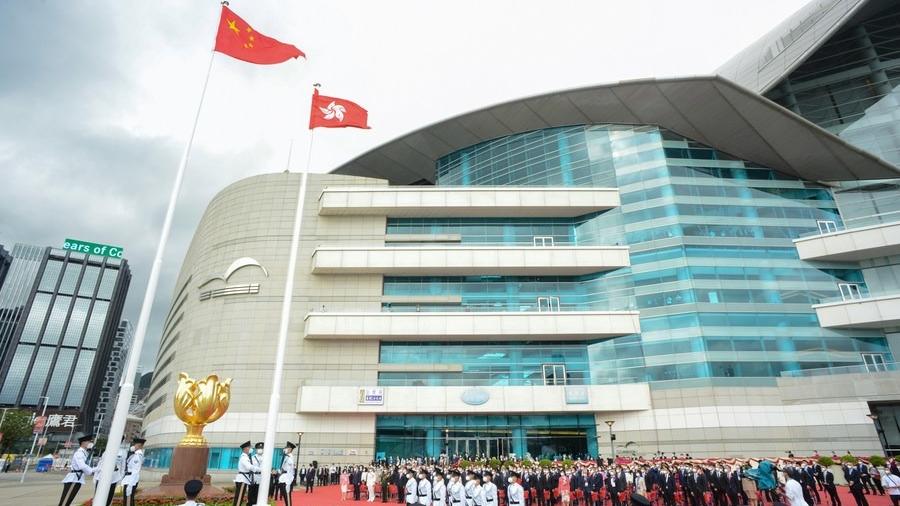 A flag-raising ceremony is held by the government of the Hong Kong Special Administrative Region to celebrate the 25th anniversary of Hong Kong's return to the motherland, at the Golden Bauhinia Square in Hong Kong, south China, July 1, 2022. (PHOTO / XINHUA)
A flag-raising ceremony is held by the government of the Hong Kong Special Administrative Region to celebrate the 25th anniversary of Hong Kong's return to the motherland, at the Golden Bauhinia Square in Hong Kong, south China, July 1, 2022. (PHOTO / XINHUA)
Officials strongly condemned some Western politicians on Wednesday for criticizing Hong Kong's new national security law, saying the attacks cannot stop the Hong Kong Special Administrative Region from achieving greater success.
The SAR will enforce the Safeguarding National Security Ordinance on Saturday after it was unanimously cleared by the Legislative Council on Tuesday. The law has been created to prevent and punish five types of acts endangering national security, including treason, theft of state secrets and espionage.
Some Western politicians have been critical of the ordinance, claiming that it will undermine Hong Kong's freedom. Among those who have been critical are David Cameron, the foreign secretary of the United Kingdom and Josep Borrell, high representative for foreign affairs and security policy of the European Union.
The Chinese Foreign Ministry on Wednesday said it is firmly opposed to some countries and organizations denigrating and smearing the SAR's national security ordinance.
Grenville Cross, senior counsel and former director of public prosecutions of the Hong Kong SAR, said some Western politicians only view the ordinance as a stick to beat Hong Kong with
At the Foreign Ministry's regular news conference, spokesman Lin Jian said the ordinance is a milestone in the development of "one country, two systems" in Hong Kong. It helps the city fulfill its constitutional responsibility of safeguarding national security, and further strengthens the security foundation for Hong Kong's development, Lin said.
Lin stressed that any attack and smear on the ordinance is destined to be in vain.
ALSO READ: HK at UNHRC: Law a better protection from genuine threats
In a strongly worded statement issued on Wednesday, a spokesperson for the Commissioner's Office of the Foreign Ministry in Hong Kong refuted Cameron's remarks, emphasizing the new security law, legislated under Article 23 of the Basic Law, will not affect Hong Kong's high degree of autonomy, and will fully protect the normal activities of foreign institutions and personnel in the SAR.
The spokesperson noted that the Sino-British Joint Declaration does not give the UK any right to interfere in Hong Kong affairs after the city's return to the motherland in 1997. He urged the British politicians to give up the illusion of continuing to peddle colonial influence in the city, and stop interfering in the internal affairs of China and the SAR.
In a separate statement, the commissioner's office urged the EU to face up to Hong Kong people's broad support for the legislation, saying the ordinance is set to provide strong legal protection for the city's high-quality development and opening-up, better safeguard the properties of local residents, boost the confidence of local and overseas investors, and create a safer, and a more convenient and efficient business environment.
The HKSAR government too on Wednesday condemned some Western countries, organizations and politicians for continuously making slanderous, highly misleading and false statements on the ordinance.
A spokesperson for the SAR government emphasized that the ordinance was broadly supported by various sectors in Hong Kong, helping the city effectively prevent, stop and punish acts that endanger national security.
ALSO READ: Community: New security law paves way for prosperous future
Chris Tang Ping-keung, the secretary for security, said that only those who want to undermine the city do not want Hong Kong to have a law to protect national security.
Experts familiar with Hong Kong affairs also criticized the smear campaign.
Grenville Cross, senior counsel and former director of public prosecutions of the Hong Kong SAR, said some Western politicians only view the ordinance as a stick to beat Hong Kong with.
He pointed out that the primary allegation is that it threatened human rights. On the contrary, Cross said the ordinance spares no effort to protect human rights, which goes further than any law in other common law jurisdictions such as Australia, Canada, the UK and the United States.
British political and international relations analyst Tom Fowdy said that there is a persistent view that the city cannot make national security laws but only accept Western backed political interference.
Fowdy called the view "nonsensical", saying that only those who have attempted to weaponize the city against China violate the city's long-standing strengths.


